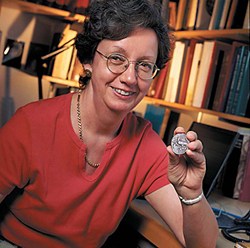 |
| Carmen Arnold-Biucchi |
| Photograph by Jim Harrison |
Harvard's first curator of numismatic collections, overseeing a trove of 22,000 coins in the Department of Ancient and Byzantine Art and Numismatics at the Arthur M. Sackler Museum, is Carmen Arnold-Biucchi, who comes to the job after 18 years at the American Numismatic Society in New York City. "The collection is most famous for having been stolen. I hope to change that," she says, referring to the 1973 armed robbery of thousands of ancient coins. Most were finally recovered (see "Picking Harvard's Pocket," May-June 2000, page 44). She is rearranging the collection, by mint; updating the electronic database; identifying gaps to be filled by acquisitions; pursuing scholarly workincluding a book on the archaic coins of Selinus, Sicilythat will publish the collection more extensively; and demonstrating ways to use the coins in teaching. In Betsey Robinson's archaeology course on the Seven Wonders of the World, for instance, Arnold-Biucchi showed students bronze coins from Roman Alexandria that provide the best contemporary depiction of its wondrous Pharos, or lighthouse, long since in ruins. Trained as a classical archaeologist in her native Switzerland and in Germany, she has taught at several universities and will step to the lectern for "Ancient Greece through Its Coins" in the Extension School this coming spring. Here she holds a great treasure, a 10-drachma silver coin struck in the Greek city of Akragas in Sicily in the late fifth century B.C., with two eagles and a hare on the reverse. Only eight such coins are known. Says Arnold-Biucchi, "I never dreamed I'd have one in my collection."





